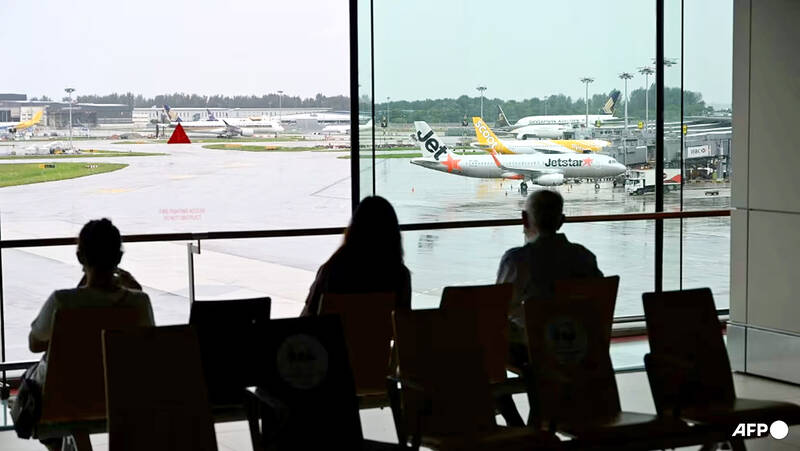Five Southeast Asian nations yesterday said that they had agreed to share aviation data and information among themselves, including reports of severe turbulence, to help make air travel safer.
Indonesia, Malaysia, the Philippines, Singapore and Thailand on Wednesday signed a memorandum of understanding, aiming to launch the plan by the end of the year, their civil aviation authorities said in a joint statement.
The agreement comes as air travel recovers from the COVID-19 pandemic, which hammered tourism in the region.

Photo: AFP
The initiative was mooted last year, but it took time for the countries to agree on what to share and the draw up protocols that would govern data confidentiality.
“In a first-of-its kind initiative in the Asia-Pacific, the five states will collaborate and share de-identified safety data and safety information to identify safety hazards and trends, and develop mitigating measures to better manage safety risks,” the statement said.
The countries identified an initial seven categories to be shared, including collision warnings, deviations from altitudes assigned by air traffic controllers and activation of warning systems on the ground.
Reports of severe air turbulence, wind shear, bird strikes and the carriage of dangerous goods are also to be shared.
The Civil Aviation Authority of Thailand would act as the “custodian” of the data and its Singapore counterpart the “data analyst,” the statement said.
The data, findings and recommendations from analyses of the information “shall not be used to support investigations of accidents and incidents, and shall not be used for punitive or enforcement purposes,” the statement said.
Civil Aviation Authority of Singapore Director-General Han Kok Juan said that he hoped other countries would join “to ensure safer skies for the traveling public.”

‘FORM OF PROTEST’: The German Institute Taipei said it was ‘shocked’ to see Nazi symbolism used in connection with political aims as it condemned the incident Sung Chien-liang (宋建樑), who led efforts to recall Democratic Progressive Party (DPP) Legislator Lee Kun-cheng (李坤城), was released on bail of NT$80,000 yesterday amid an outcry over a Nazi armband he wore to questioning the night before. Sung arrived at the New Taipei City District Prosecutors’ Office for questioning in a recall petition forgery case on Tuesday night wearing a red armband bearing a swastika, carrying a copy of Adolf Hitler’s Mein Kampf and giving a Nazi salute. Sung left the building at 1:15am without the armband and apparently covering the book with a coat. This is a serious international scandal and Chinese

SECURITY: As China is ‘reshaping’ Hong Kong’s population, Taiwan must raise the eligibility threshold for applications from Hong Kongers, Chiu Chui-cheng said When Hong Kong and Macau citizens apply for residency in Taiwan, it would be under a new category that includes a “national security observation period,” Mainland Affairs Council (MAC) Minister Chiu Chui-cheng (邱垂正) said yesterday. President William Lai (賴清德) on March 13 announced 17 strategies to counter China’s aggression toward Taiwan, including incorporating national security considerations into the review process for residency applications from Hong Kong and Macau citizens. The situation in Hong Kong is constantly changing, Chiu said to media yesterday on the sidelines of the Taipei Technology Run hosted by the Taipei Neihu Technology Park Development Association. With

A US Marine Corps regiment equipped with Naval Strike Missiles (NSM) is set to participate in the upcoming Balikatan 25 exercise in the Luzon Strait, marking the system’s first-ever deployment in the Philippines. US and Philippine officials have separately confirmed that the Navy Marine Expeditionary Ship Interdiction System (NMESIS) — the mobile launch platform for the Naval Strike Missile — would take part in the joint exercise. The missiles are being deployed to “a strategic first island chain chokepoint” in the waters between Taiwan proper and the Philippines, US-based Naval News reported. “The Luzon Strait and Bashi Channel represent a critical access

COUNTERINTELLIGENCE TRAINING: The ministry said 87.5 percent of the apprehended Chinese agents were reported by service members they tried to lure into becoming spies Taiwanese organized crime, illegal money lenders, temples and civic groups are complicit in Beijing’s infiltration of the armed forces, the Ministry of National Defense (MND) said in a report yesterday. Retired service members who had been turned to Beijing’s cause mainly relied on those channels to infiltrate the Taiwanese military, according to the report to be submitted to lawmakers ahead of tomorrow’s hearing on Chinese espionage in the military. Chinese intelligence typically used blackmail, Internet-based communications, bribery or debts to loan sharks to leverage active service personnel to do its bidding, it said. China’s main goals are to collect intelligence, and develop a